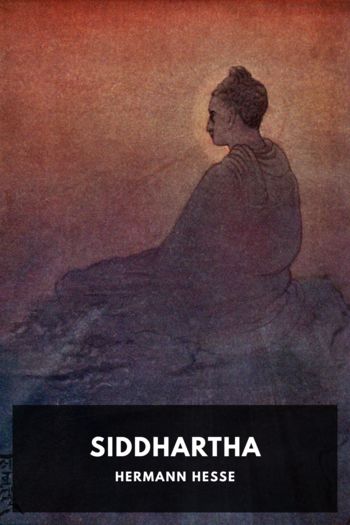Siddhartha Hermann Hesse (e reader .TXT) 📖

- Author: Hermann Hesse
Book online «Siddhartha Hermann Hesse (e reader .TXT) 📖». Author Hermann Hesse
All of this had always existed, and he had not seen it; he had not been with it. Now he was with it, he was part of it. Light and shadow ran through his eyes, stars and moon ran through his heart.
On the way, Siddhartha also remembered everything he had experienced in the Garden Jetavana, the teaching he had heard there, the divine Buddha, the farewell from Govinda, the conversation with the exalted one. Again he remembered his own words, he had spoken to the exalted one, every word, and with astonishment he became aware of the fact that there he had said things which he had not really known yet at this time. What he had said to Gotama: his, the Buddha’s, treasure and secret was not the teachings, but the unexpressable and not teachable, which he had experienced in the hour of his enlightenment—it was nothing but this very thing which he had now gone to experience, what he now began to experience. Now, he had to experience his self. It is true that he had already known for a long time that his self was Atman, in its essence bearing the same eternal characteristics as Brahman. But he had never really found this self, because he had wanted to capture it in the net of thought. With the body definitely not being the self, and not the spectacle of the senses, so it also was not the thought, not the rational mind, not the learned wisdom, not the learned ability to draw conclusions and to develop previous thoughts in to new ones. No, this world of thought was also still on this side, and nothing could be achieved by killing the random self of the senses, if the random self of thoughts and learned knowledge was fattened on the other hand. Both, the thoughts as well as the senses, were pretty things, the ultimate meaning was hidden behind both of them, both had to be listened to, both had to be played with, both neither had to be scorned nor overestimated, from both the secret voices of the innermost truth had to be attentively perceived. He wanted to strive for nothing, except for what the voice commanded him to strive for, dwell on nothing, except where the voice would advise him to do so. Why had Gotama, at that time, in the hour of all hours, sat down under the bo tree, where the enlightenment hit him? He had heard a voice, a voice in his own heart, which had commanded him to seek rest under this tree, and he had neither preferred self-castigation, offerings, ablutions, nor prayer, neither food nor drink, neither sleep nor dream, he had obeyed the voice. To obey like this, not to an external command, only to the voice, to be ready like this, this was good, this was necessary, nothing else was necessary.
In the night when he slept in the straw hut of a ferryman by the river, Siddhartha had a dream: Govinda was standing in front of him, dressed in the yellow robe of an ascetic. Govinda looked sad, and sadly he asked: Why have you forsaken me? At this, he embraced Govinda, wrapped his arms around him, and as he was pulling him close to his chest and kissed him, it was not Govinda any more, but a woman, and a full breast popped out of the woman’s dress, at which Siddhartha lay and drank, sweetly and strongly tasted the milk from this breast. It tasted of woman and man, of sun and forest, of animal and flower, of every fruit, of every joyful desire. It intoxicated him and rendered him unconscious.—When Siddhartha woke up, the pale river shimmered through the door of the hut, and in the forest, a dark call of an owl resounded deeply and pleasantly.
When the day began, Siddhartha asked his host, the ferryman, to get him across the river. The ferryman got him across the river on his bamboo raft, the wide water shimmered reddishly in the light of the morning.
“This is a beautiful river,” he said to his companion.
“Yes,” said the ferryman, “a very beautiful river, I love it more than anything. Often I have listened to it, often I have looked into its eyes, and always I have learned from it. Much can be learned from a river.”
“I thank you, my benefactor,” spoke Siddhartha, disembarking on the other side of the river. “I have no gift I could give you for your hospitality, my dear, and also no payment for your work. I am a man without a home, a son of a Brahmin and a Samana.”
“I did see it,” spoke the ferryman, “and I haven’t expected any payment from you and no gift which would be the custom for guests to bear. You will give me the gift another time.”
“Do you think so?” asked Siddhartha amusedly.
“Surely. This too, I have learned from the river: everything is coming back! You too, Samana, will come back. Now farewell! Let your friendship be my reward. Commemorate me when you make offerings to the gods.”
Smiling, they parted. Smiling, Siddhartha was happy about the friendship and the kindness of the ferryman. “He is like Govinda,” he thought with a smile, “all I meet on my path are like Govinda. All are thankful, though they are the ones who would have a right to receive thanks. All are submissive,





Comments (0)